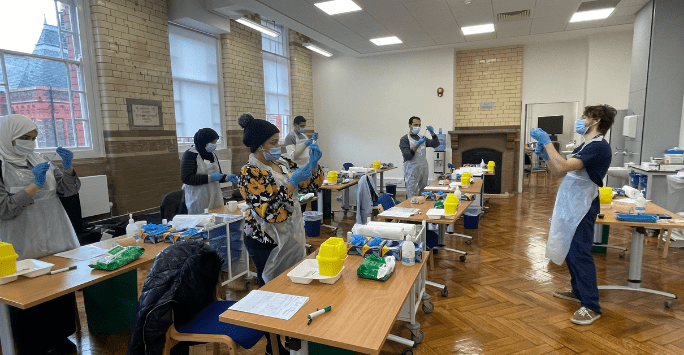
Liverpool School of Medicine’s Clinical Skills Team is providing refugee doctors with crucial clinical training as they work towards their GMC registration and becoming practising doctors here in the UK.
A tailor-made two-day programme was developed by the School, in partnership with NHS England and NHS Improvement North West, and piloted this week to a group of ten, providing the opportunity to update their clinical skills in preparation for their new positions as Medical Support Workers at NHS trusts across the region.
It can take up to three years for a medic with refugee status to meet the requirements of the Professional and Linguistic Assessments Board (PLAB) test and register with the General Medical Council (GMC) The new Medical Support Worker role follows the success of a similar initiative for refugee nurses. It aims to help speed up this process by providing access to timely hands-on clinical practice, required to register with the GMC.
Doctors supported by RefuAid in action at the clinical skills sessions today at @LivUniMedicine. The doctors will soon be returning to clinical practice as Medical Support Workers in hospitals across the North West thanks to our partnership with @NHSEngland #WeAreOne pic.twitter.com/jrlXMk0EEF
— RefuAid (@refuaid) January 31, 2022
Dr Rachel Saunders, NHS England and NHS Improvement Regional Clinical Fellow and ST6 Intensive Care trainee, is project manager for the North West's Medical Support Worker initiative. She first put forward the idea of setting up a clinical skills refresher course and reached out to the School of Medicine in November of last year to get things moving.
“We are partnering with 5 trusts across the North West - Arrowe Park, Mid Cheshire, Alder Hey, Morecambe Bay and Bolton - to provide Medical Support Worker placements. These refugee doctors have extensive skills and knowledge but often need to familiarise themselves with the culture and practice within the NHS.
We designed an education and resource platform but felt that the doctors would benefit from hands-on clinical skills training."
It felt like the perfect opportunity to partner with the Clinical Skills department at Liverpool School of Medicine, who have such a good reputation for producing high calibre doctors.
Interestingly, the Medical Support Worker position is actually borne out of the sub FY1 role specifically created here in Liverpool during the pandemic to enable final-year student doctors to provide crucial support to the NHS where it was most needed.
“Our approach to designing the programme was to strip things right round. We knew we would have people at different levels of their training and practice. We worked to create a programme that was standardised and meaningful for the role in question. Some may have not been practicing for a while, and some may be very experienced consultants who haven’t, for example, practiced venepuncture – taking blood – for a good few years. It was really all about getting back to basics.” says Helen Box, Director of Clinical Skills & Simulation.
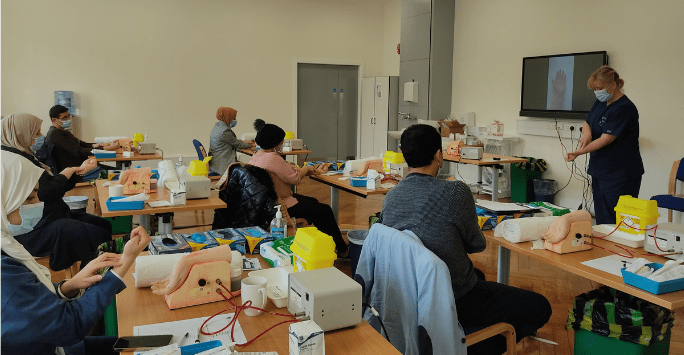
“We used the same ‘flipped classroom’ approach that we apply to teaching student doctors. This is a blended learning model involving in-depth self-learning as preparation for the skill in question, supported by online resources and step-by-step video tutorials. This is then run through in the classroom with a brief explanation and demonstration, followed by plenty of opportunity to practice under the supervision of expert lecturers and receive feedback to aid skills development and progression.”
Ahmed Ali has eleven years' experience in paediatrics in Egypt and hopes to progress into paediatric cardiology in the future. He is about to take up the Medical Support Worker role at Liverpool’s Alder Hey Children’s Hospital.
Alder Hey is a really important tertiary care site with children coming from all over the region and beyond. I’m excited to get started.
Razhan Khdir arrived in the UK just four months ago. Razhan has completed her foundation years in her home country of Iraq and is looking forward to starting as a Medical Support Worker at Morecambe Bay. She has been impressed with the programme’s content and organisation.
“It has been excellent. During my studies, we tended to practice on simulated patients or on each other, as well as with equipment of course. But the standard of equipment here is really high, and there is just so much of it which you can use to practice.”
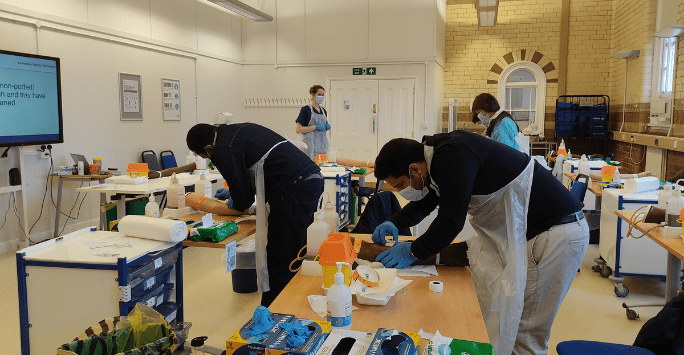
The programme is led by experienced Clinical Skills Lecturer Vicky Bond. “It’s such a diverse group from a wide range of clinical experiences and home countries. Some came to the UK just a couple of months ago, while others have been here much longer, for up to ten years,” explains Vicky.
We’ve taken core teaching material from our MBChB programme and focused on the approaches to these which may be new or different to what the group has experienced previously.
"For example, when demonstrating injection technique, many were unaware that research now dictates we no longer need to clinically clean the skin or pull back on the plunger of the syringe when injecting intramuscularly. Something many of us with years of experience find a significant change to our practice.
It’s all about refreshing the skill and updating knowledge based on the most recent findings, particularly for those who have been away from clinical practice for a good number of years. The programme also allowed participants to become familiar with a number of examination models which may be utilised in the PLAB test, something they were very grateful for.”
Vicky is supported by four other members of the Clinical Skills teaching team who delivered the programme, teaching four key skills each day, including venepuncture, cannulation and arterial blood gas testing. Learners then had the opportunity to practice their skills in the School’s state of the art Clinical Skills Learning Zone on campus.
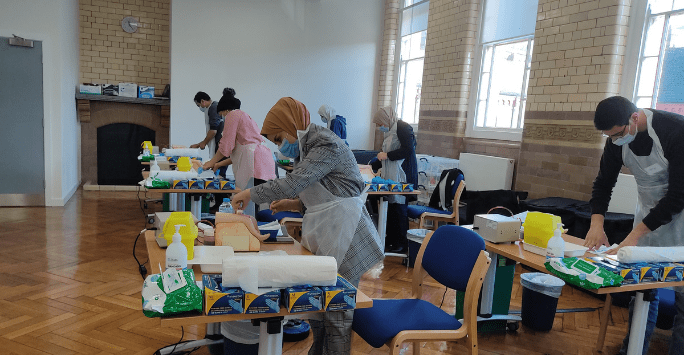
The programme is just the latest in a long line of achievements the Clinical Skills Team can pride themselves on over the last couple of years, where they have worked tirelessly to continue delivering skills training to undergraduates on the MBChB programme as well as facilitate the necessary clinical assessments as they work towards qualification.
This has required endless amounts of creativity and flexibility, adapting and creating resources to work virtually or in a COVID-safe environment, and moving thousands of student doctors, examiners and simulated patients through hundreds of safely distanced clinical scenarios at assessments at Aintree Racecourse.
It has been a privilege to create and deliver this bespoke clinical skills programme. This pilot is a great initiative and myself and the team have been extremely proud to be a part of it.
"As a team, we have faced huge challenges throughout the pandemic to continue to deliver essential clinical skills training to our undergraduate students.
I am extremely proud of how the team have adapted to ensure that teaching and assessment has not only been maintained but also continually delivered at the high standards expected by both staff and students.” says Cathy Carr, Deputy Director of Clinical Skills.
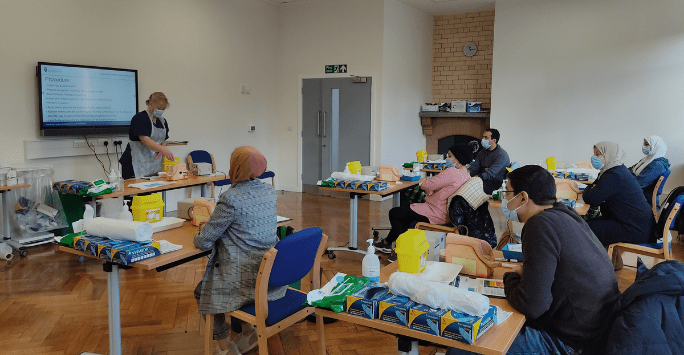
On completion of the programme, participants took the time to provide an evaluation of their experience, commenting on how beneficial it was to have the opportunity to refresh skills and knowledge before commencing work. One commented, “I am very thankful for your help and support. You all deserve a big cheer from me."
Thank you. I will remember you for the rest of my life.
Vicky Bond adds, “It was a privilege to meet so many warm and enthusiastic doctors who wanted to embrace the ethos of the School.
One particularly poignant moment was when we were discussing the history of the School and looking at photos along our history wall depicting the Waterhouse building as the old Royal Hospital when it was bombed during the Second World War. Two of the participants commented, "That is what is happening in our home country right now," reminding me just how important this work is.”